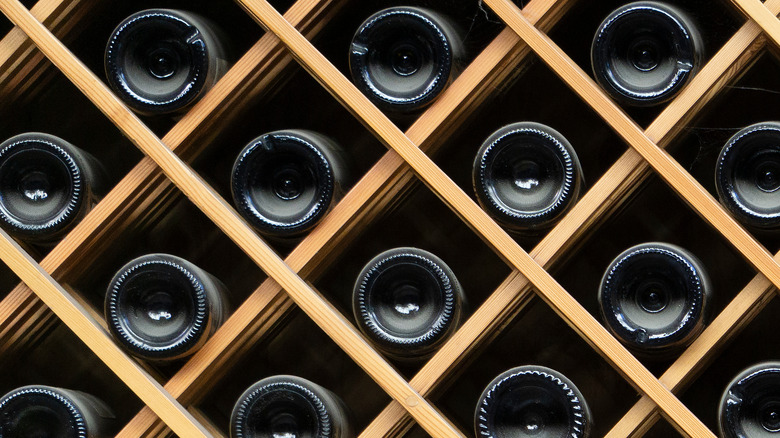If You've Ever Wanted To Invest In Wine, Do It Now
High net worth investors with plenty of cash to spare usually have different places where they can park their funds and earn even more. Some invest in traditional means like stocks and bonds, while others choose property. Still others put their money in art and luxury handbags. But, there is a growing number of investors that are putting their cash in high-end beverages, like rare whiskies and wines (via Food & Wine), and it's paying off.
Alternative investment advisers say there's no better time to buy wines than the present, and they even have a wine index that shows potential investors why this is true. Decanter says that, in the period of June 2020 to June 2021, fine wines outperformed other investment items like expensive watches, cars, and jewelry. While the index of rare whiskies skyrocketed by 483%, a similar index for fine wines increased by a respectable 119%. In terms of actual pricing, Food & Wine estimates that "investment-grade wine increased by 13% over the past year."
Wine collectors that are buying to invest aren't just on the lookout for traditional French varietals, either — they're also looking to acquire Italian and California labels. Nick Martin of Wine Owners exchange and the person who helped pull together a definitive fine wine index, said in Decanter's article, "Wine is doing really well, not going crazy, but growing nicely. It helps that the market is becoming much broader with more of the next generation starting to build their own collections."
Investment wines aren't just bought to be sipped
It might seem counterintuitive to park your cash in something you probably enjoy consuming during your downtime, but investing in wines isn't about buying your favorite supermarket label and hoarding it for a rainy day. As Anthony Zhang, co-founder and CEO of wine investment firm Vino Vest, explains in Forbes, wines are now seen as a good investment because they aren't tied to traditional market indices like stocks or bonds in any way. Furthermore, they are not linked to economic indicators like growth, recession, or inflation — and collectors are able to get their hands on their investment, which often isn't the case with financial investments.
"[Wine] doesn't play by the same rules as stocks and bonds," Zhang writes in the article. "While the stock market fluctuates based on company earnings, corporate management, and interest rates, among other factors, fine wine prices are subject to a different set of influences." He adds, "Wine prices move based on annual harvest yields, consumer tastes, and weather. As a result, wine has a low correlation with traditional markets."
Wine provides good returns, but they aren't guaranteed
If you're looking to invest in wine, know that pouring your money into this asset isn't as simple as scoring a case of Two Buck Chuck. Zhang further explains in his article that most wines earn points for being a good investment when they "tend to earn an average score of 95% or higher from wine critics ... [and] have the proper acid, sugar, tannin, and alcohol levels to develop secondary and tertiary flavors." He adds that its also important for a wine to come from a well-known brand, with a strong vintage, and is one that is rare or difficult to find (via Forbes).
But, even if you find the perfect wine to park your money in, it is still important to remember that, as with all investments, you're never really guaranteed a return, no matter how good an index might look at the time (via Decanter). Yet, the good news, at least where wines are concerned, is if the bottom should fall out of the market, you'll still have something in your cellar worth enjoying with your friends.


